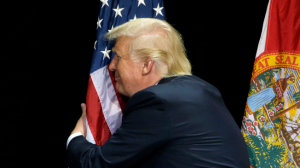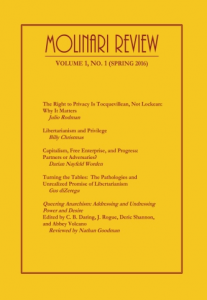[cross-posted at C4SS and BHL]
President-elect Donald Trump’s recent call for a year’s prison term or loss of citizenship for those who burn the American flag – incidentally a reversal of Trump’s previous support for flag-burners on the Letterman show two years ago – leaves me with some questions. Four questions, specifically: two for Trump’s conservative supporters, and two for his liberal critics.

My first question for pro-Trump conservatives is this: In the past I seem to recall hearing quite a few of you (though admittedly not Trump himself) speaking pretty loudly in favor of free expression when the issue was laws in Muslim countries criminalizing speech or writings that “disrespect” Islam or the Prophet Muhammad. How exactly do the arguments you gave then, not apply to Trump’s proposal now?
Second, I also recall that you conservatives used to talk a lot about government’s duty to protect people’s private property rights (although admittedly eminent domain poster boy Donald Trump was never really in your camp on that issue either). Well, if I buy an American flag with my own honestly earned money, or make one with my own cloth and thread, it seems like it’s then my property, the product of my labor; and I don’t see why I shouldn’t have the right to burn my own property, if I do it without endangering anyone else. If the government claims that it, rather than myself, is the one who gets to decide what I do with my flag – that it is, in effect, the real owner of the flag I bought or made – doesn’t that sound more like communism than like a free market?
Next, I have a couple of questions for the liberals who’ve been criticizing Trump’s proposal for its excessive harshness toward flag burners. First: It’s great that you’re calling Trump out on his contempt for freedom of expression; but how many of you were offering similar howls of outrage just over a decade ago when Hillary Clinton was supporting the Flag Protection Act of 2005, which likewise called for one-year prison terms for flag burners?
Finally, a question especially for those liberal critics who say that they support the right to burn the flag but disagree with the flag burner’s message. What exactly is supposed to be wrong with the flag burner’s message?
Even if the flag were legitimately a symbol of freedom, a ban on flag burning would be an odd way to honor the flag – sacrificing the reality of freedom to the mere symbol. But is freedom what the flag really stands for?

It’s now becoming more widely accepted that the Confederate flag, however much its supporters may revere it as an icon of freedom, is inextricably associated with the cause of slavery and white supremacy. But how is the American flag – the symbol of the Federal government – any more defensible?
The Confederate flag flew over slavery for five years. The American flag flew over slavery for nearly a century, and then flew over Jim Crow and similar slavery-like restrictions for another century after that. (And the Federal government didn’t move against Jim Crow until the grassroots civil-rights movement had grown strong enough to be worth co-opting rather than ignoring.) And even today, the American flag flies over a country where blacks are disproportionately likely to be killed or imprisoned by agents of the state.
The same flag flew over the slaughtering of American Indians, the kidnapping of their children, and the theft of their land; and that theft still continues today, as for example in the case of the Dakota Access Pipeline. That flag also flies right now over a land where the state records our phone calls, tells us how we can and cannot medicate ourselves, and maintains a regime of privilege that props up the crony corporate elite at the expense of everyone else.
To be sure, American citizens enjoy a higher degree of freedom than do citizens in many other countries, and it is this fact that leads so many to view the American flag as a symbol of freedom. But such liberty as Americans enjoy was hard-won, in the main, by grassroots efforts that eventually prevailed against government resistance. Honoring the flag, the symbol of the Federal government, doesn’t celebrate our freedoms; it celebrates the central authority from whom those freedoms were heroically wrested.
Around the world, too, troops bearing the Americsn flag have too often propped up dictators and bombed civilian populations, from Asia to Central America to the Middle East. American bombs have killed dozens of civilians in the past several months just in Yemen alone. Is it any wonder that millions of people around the world view the American flag with fear, seeing it not as a symbol of freedom but rather as a harbinger of terror and death? In the face of that reality, defensive insistence that the flag “really” means something else rings as hollow as the neo-Confederate’s claim of “Heritage, Not Hate.”
We’ve begun, as a nation, to relinquish our blinkered reverence for the Confederate flag. It’s high time that reverence for the American flag followed it into equally well deserved oblivion.





